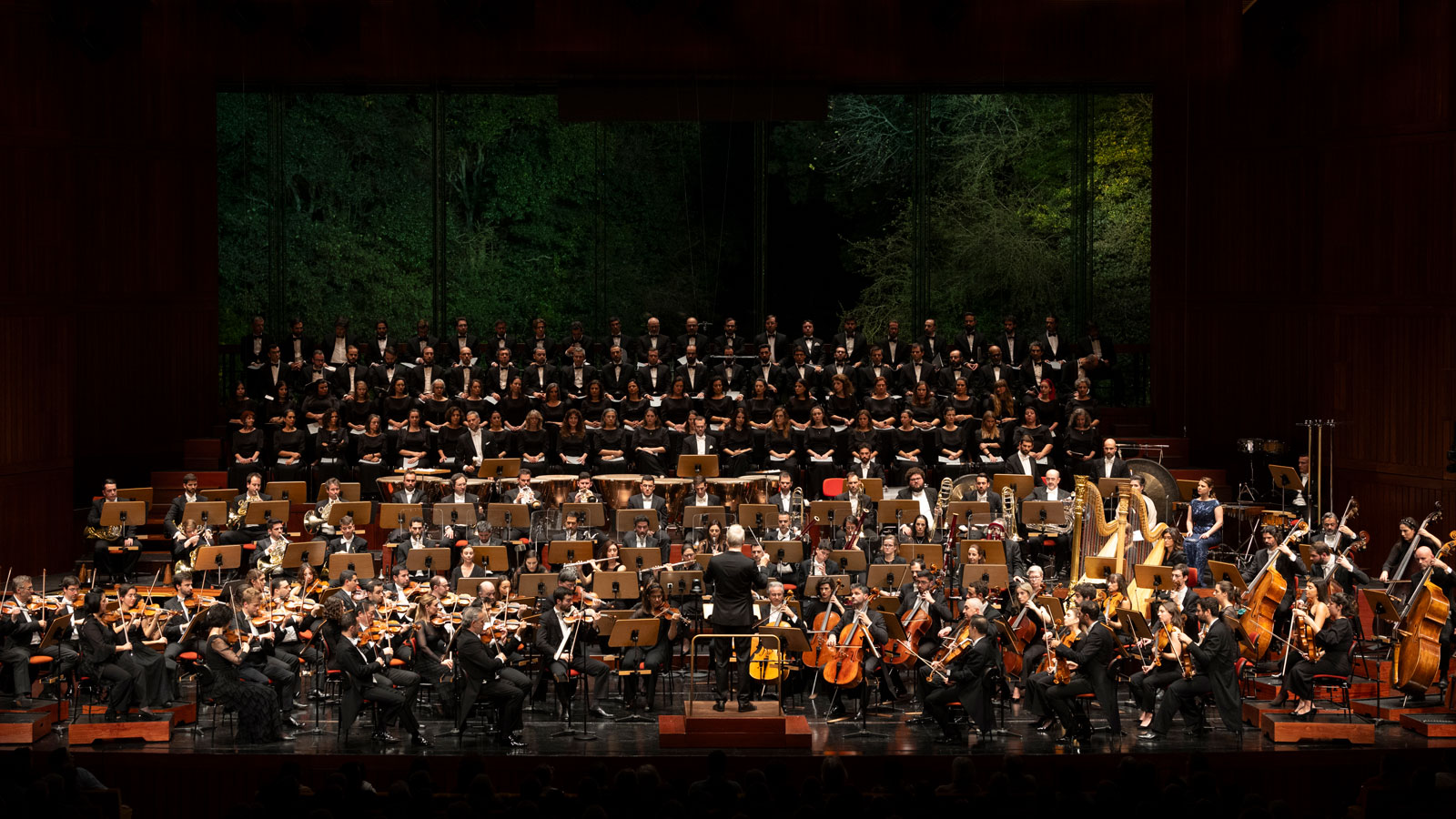The Damnation of Faust
Gulbenkian Orchestra and Choir
Event Slider
Date
- / Cancelled / Sold out
Location
Grand Auditorium Calouste Gulbenkian FoundationApproximate duration: 150 min / Intermission 20 min
Pricing
25% – Under 30
10% – Over 65
Cartão Gulbenkian:
50% – Under 30
15% – Over 65
- Coro Infantil e Juvenil do Instituto Gregoriano de Lisboa
- Conductor
- Mezzo-soprano
- Tenor
- Baritone
- Bass
-
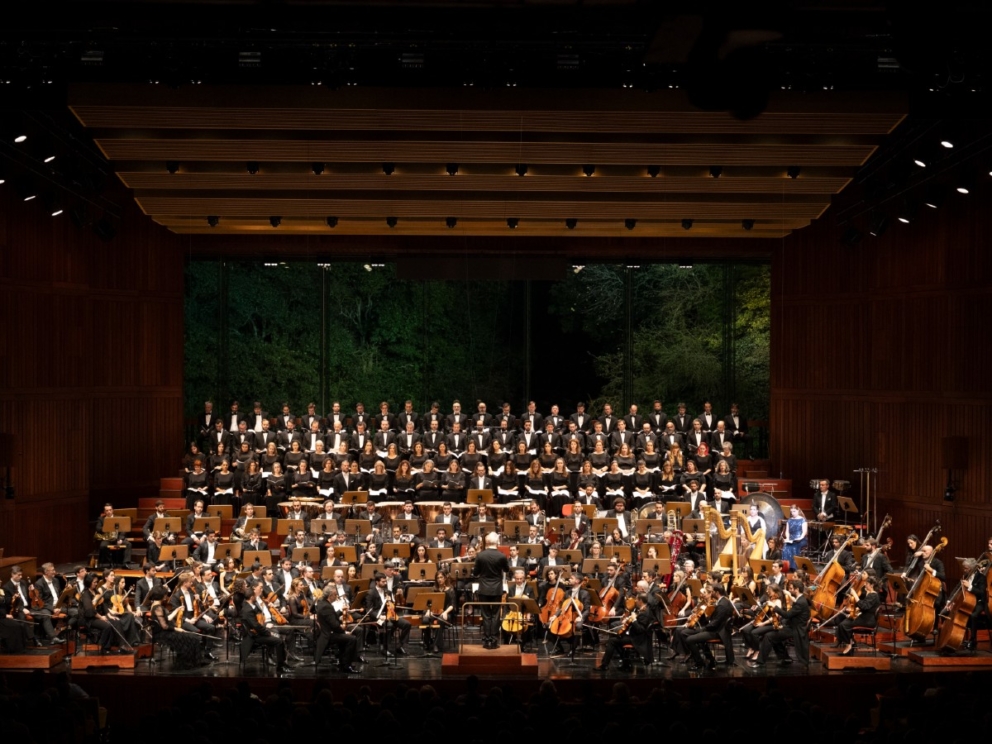
Gulbenkian Choir
Coro Gulbenkian was founded in 1964 by the Calouste Gulbenkian Foundation as a full symphonic body of around 100 singers. The choir joins the Orquestra Gulbenkian and other orchestras to perform Classical, Romantic and Contemporary choral-symphonic repertoire, but can also perform a cappella. It has performed – and often premiered – many 20th century works by Portuguese and international composers.
Coro Gulbenkian has been invited to collaborate with major international orchestras, under the direction of conductors such as Claudio Abbado, Colin Davis, John Nelson, Emmanuel Krivine, Esa-Pekka Salonen, Frans Brüggen, Franz Welser-Möst, Gerd Albrecht, Michael Gielen, Michael Tilson Thomas, Rafael Frübeck de Burgos, René Jacobs and Leonard Slatkin, among others.
Besides its regular season of concerts in Lisbon and frequent national tours, Coro Gulbenkian has repeatedly toured Argentina, Belgium, Brazil, Canada, Denmark, France, Germany, Hungary, India, Iraq, Israel, Italy, Japan, Macao, Malta, Monaco, Netherlands, Spain, the United Kingdom, the United States of America and Uruguay.
Coro Gulbenkian has recorded extensively for Philips, Deutsche Grammophon, Erato, Cascavelle, Musifrance, as well as FNAC-Music, performing a wide range of repertoire, from Early-Renaissance polyphony to Xenakis. Several of these albums received international awards.
Michel Corboz was the Principal Conductor between 1969 and 2019. Jorge Matta and Inês Tavares Lopes are currently the Associate and Assistant conductors, respectively.
-
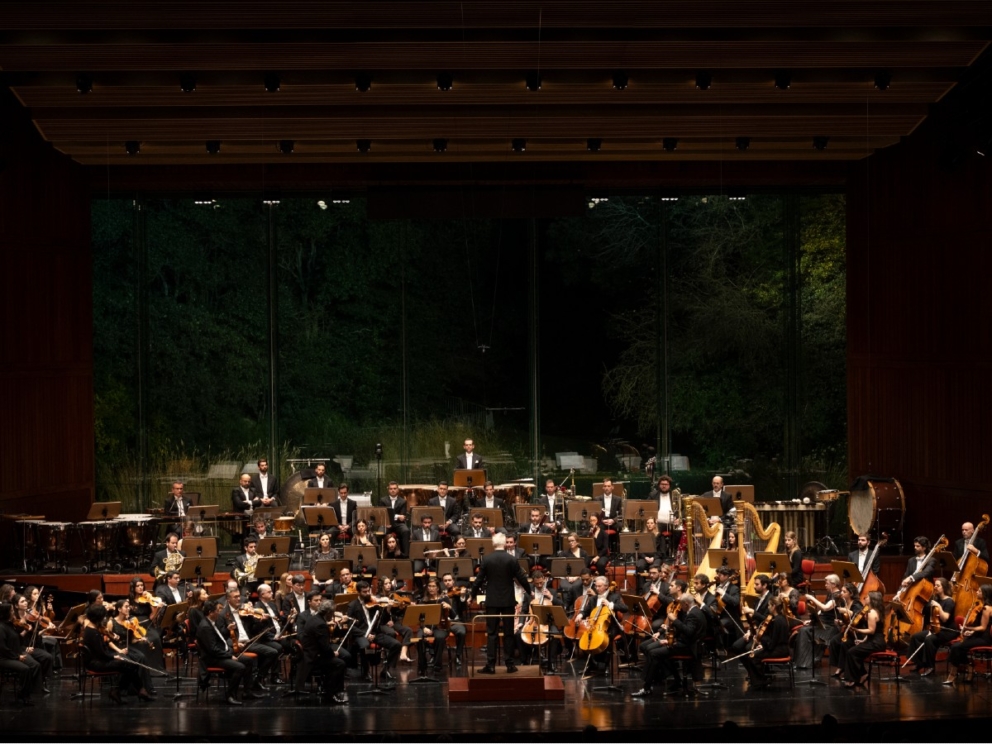
Gulbenkian Orchestra
In 1962, the Calouste Gulbenkian Foundation decided to establish a permanent orchestral ensemble. Originally with only twelve musicians (strings and continuo) it was named “Orquestra de Câmara Gulbenkian”. This collective was successively enlarged and today the “Orquestra Gulbenkian” (the name it has adopted since 1971) has a permanent body of sixty instrumentalists, a number that can be expanded depending on the repertoire.
This structure allows the Gulbenkian Orchestra to interpret works from the Baroque and Classical periods, a significant part of 19th century orchestral literature and much of the music of the 20th century, including works belonging to the current repertoire of the traditional symphonic orchestras. In each season, the orchestra performs on a regular series of concerts at the Gulbenkian Grand Auditorium in Lisbon, where it has had the opportunity of working together with some of leading names of the world of music (conductors and soloists). It has also performed on numerous locations all over Portugal, in an effort to decentralize music and culture.
The orchestra has been constantly expanding its activities in the international level, performing in Europe, Asia Africa, and the Americas. In the recording field, Orquestra Gulbenkian is associated to labels as Philips, Deutsche Grammophon, Hyperion, Teldec, Erato, Adès, Nimbus, Lyrinx, Naïve and Pentatone, among others, and this activity was recognized with several international prizes.
-
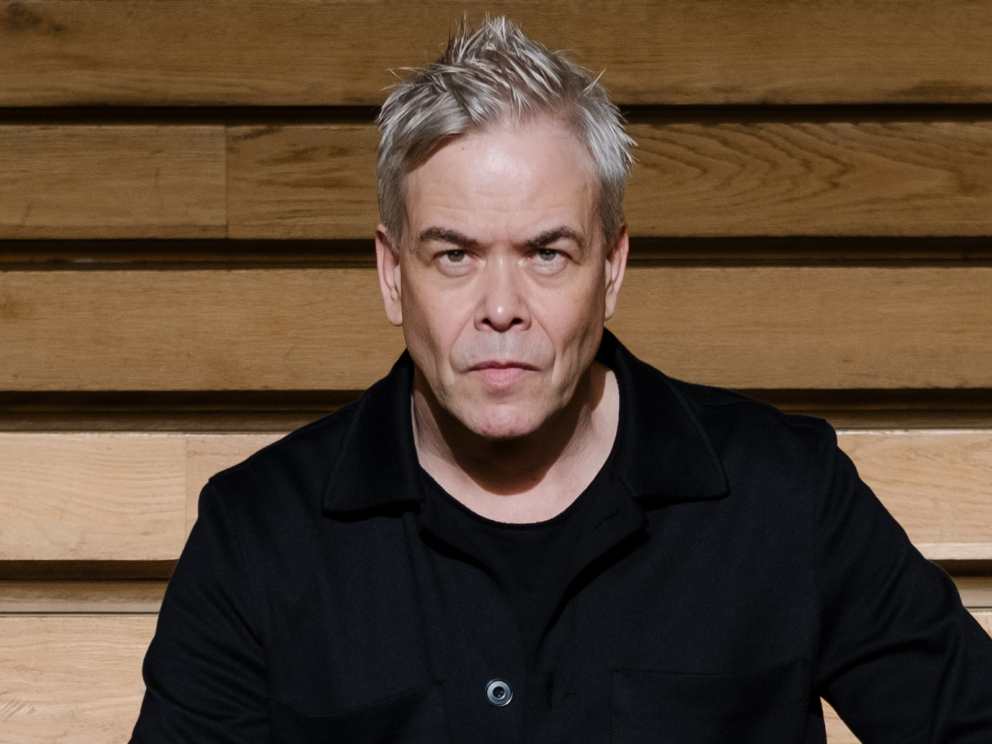
Hannu Lintu
Music Director
“Dynamic and sharp on the podium” (Bachtrack) and with a “scrupulous ear for instrumental color and blend” (Washington Post), Hannu Lintu maintains his reputation as one of the world’s finest conductors. This season, Lintu continues his tenures as Music Director of Orquestra Gulbenkian and Chief Conductor of Finnish National Opera and Ballet, proving himself a master of both symphonic and operatic repertoire. The appointments followed a stream of successful concerts with Orquestra Gulbenkian and breathtaking productions with Finnish National Opera and Ballet. The 2023/24 season also saw his announcement as Artistic Partner of Lahti Symphony Orchestra from Autumn 2025.
Highlights of the 2024/25 season include his debut at Bregenzer Festspiele conducting Oedipe and returns to Chicago Symphony, BBC Symphony, Finnish Radio Symphony, London Philharmonic, St Louis Symphony and Oregon Symphony.
Symphonic highlights of recent years have seen Lintu conduct the New York Philharmonic (including an immediate re-invitation from the orchestra to perform at Bravo! Vail Festival), Berliner Philharmoniker, Cleveland Orchestra, Bavarian Radio Symphony Orchestra, Orchestre National de Radio France, Boston Symphony Orchestra, Swedish Radio Symphony Orchestra, Deutsches Symphonie-Orchester Berlin, Radio Filharmonisch Orkest, Atlanta Symphony Orchestra, Konzerthaus Berlin, Orchestre de Chambre de Lausanne and Orchestre Symphonique de Montréal, alongside the likes of Gil Shaham, Kirill Gerstein, Daniil Trifonov and Sergei Babayan.
As an expert in both operatic as well as symphonic repertoire, Lintu’s recent opera highlights have included Wagner’s Der fliegende Holländer at Opera de Paris and Debussy’s Pelléas et Mélisande at Bayerische Staatsoper as a guest conductor, as well as multiple productions at Finnish National Opera and Ballet, including a recent multi-season Ring Cycle, Poulenc’s Dialogues des Carmélites, Mozart’s Don Giovanni, a choregraphed reimagining of Verdi’s Messa da Requiem, Puccini’s Turandot, Richard Strauss’ Salome, and Britten’s Billy Budd.
Lintu studied cello and piano at the Sibelius Academy, where he also later studied conducting with Jorma Panula. He participated in masterclasses with Myung-Whun Chung at L’Accademia Musicale Chigiana in Siena, Italy, and took first prize at the Nordic Conducting Competition in Bergen in 1994.
-

Victoria Karkacheva
Mezzo-Soprano
Victoria Karkacheva’s current and upcoming engagements include Olga Eugene Onegin at Teatro Real Madrid, return to the Bayerische Staatsoper as Polina Pique Dame and Pénélope, the title role of Carmen at Teatro di San Carlo di Napoli, and appearances at The Metropolitan Opera, Opéra national de Paris, and Wiener Staatsoper.
Recent highlights include Charlotte Werther at Teatro alla Scala, return to Gran Teatre del Liceu in Barcelona as Olga Eugene Onegin, Polina Pique Dame, Hélène in the new Dmitri Tcherniakov's production of War and Peace at the Bayerische Staatsoper, Judith in a new production of Bluebeard’s Castle at the Opéra de Lyon, which was recorded and broadcast by Medici TV.
On a concert stage she performed Missa Solemnis with Quincena Musical de San Sebastián, a concert version of Bartók’s Bluebeard’s Castle with Josep Pons, Iolanta with Kirill Petrenko in Berliner Philharmoniker and Baden-Baden Festival, debut with Gran Teatre del Liceu in Barcelona in Mahler’s Third Symphony and with the Helsinki Philharmonic Orchestra, recital with the Stuttgarter Philharmoniker.
An alumna of the prestigious Young Artist Programme at the Bolshoi Theatre of Russia, she made her operatic debut as Aglaya in a new production of Weinberg’s The Idiot.
Victoria is a First Prize Winner and Birgit Nilsson Prize - Operalia 2021, First Prize Winner - Tenor Viñas Competition 2020.
Born in the Volgograd region, in 2015 she graduated from the Popov Academy of Choral. In the productions of the Academy’s opera studio, she has performed the parts of Lyubasha in Rimsky-Korsakov’s The Tsar’s Bride, Olga Eugene Onegin, Third Lady Die Zauberflöte, Cherubino Le nozze di Figaro, Sorceress Dido and Aeneas.
-
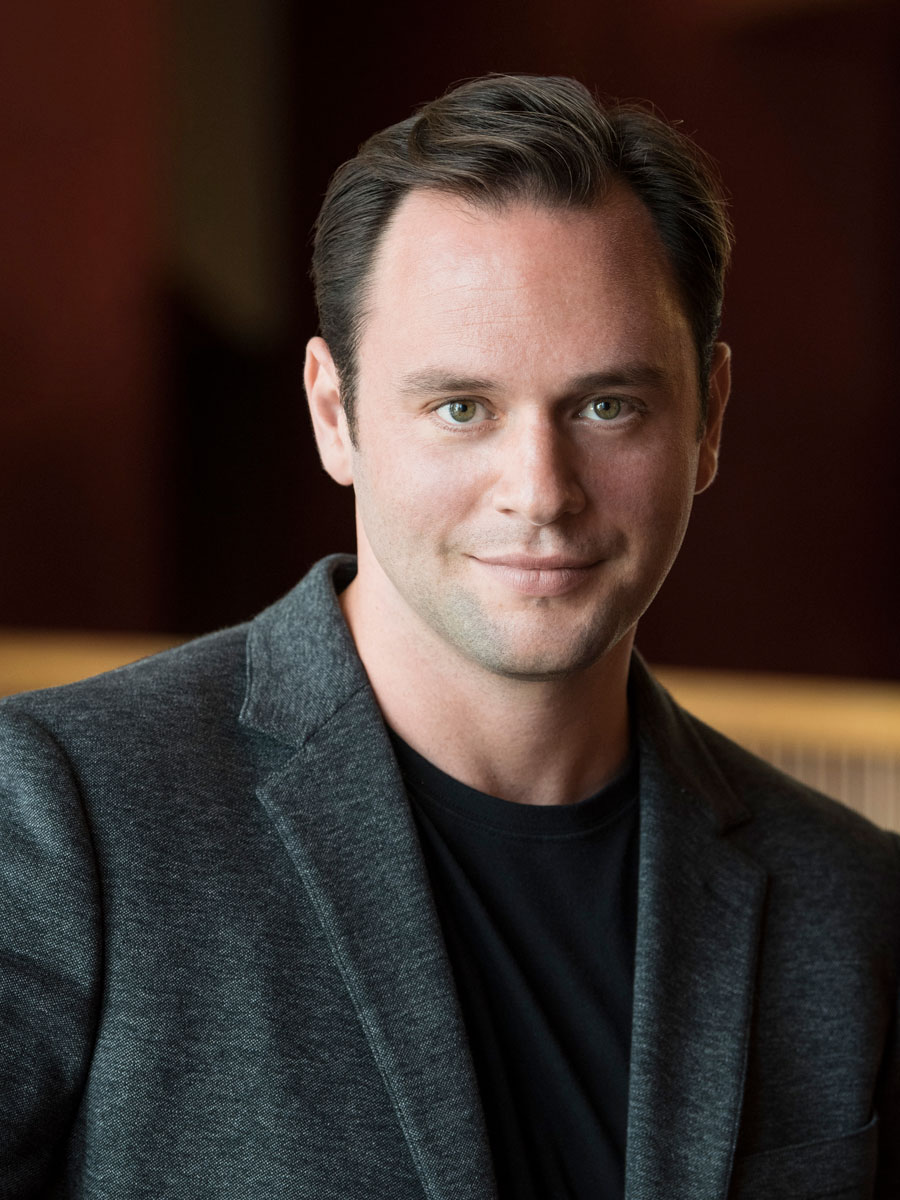
Paul Appleby
Tenor
American tenor Paul Appleby is frequently praised for his interpretive depth and is one of the most admired tenor voices of his generation, regularly appearing on the world’s leading opera, concert, and recital stages.
Appleby’s 2024/25 season includes his first performances of Berlioz’s La Damnation de Faust with Hannu Lintu and the Gulbenkian Orchestra, as Prunier in concert performances of La Rondine with Sir Antonio Pappano and London Symphony Orchestra, Haydn’s The Creation with Martin Pearlman and Boston Baroque, and Evangelist in Bach’s St Matthew Passion with Kent Tritle at New York’s Cathedral of St. John the Divine. He also returns to the stage of the Metropolitan Opera as Caesar in Antony and Cleopatra, continuing his long-standing collaboration with conductor and composer John Adams who wrote the role for him. With the Chamber Music Society of Lincoln Center, he performs John Corigliano’s captivating Poem in October, inspired by the Dylan Thomas work.
A graduate of New York’s Juilliard School and the Lindemann Young Artist Program, Appleby remains a leading artist of the Metropolitan Opera where he has given many critically acclaimed performances including as David in Wagner’s Die Meistersinger von Nürnberg under Sir Antonio Pappano, as Grimoaldo in Handel’s Rodelinda under Harry Bicket, in the title role of Pelléas et Mélisande conducted by Yannick Nézet-Séguin and in The Rake’s Progress under the baton of James Levine. In addition to performances in both Don Giovanni and Die Entführung aus dem Serail, he received unanimous acclaim in the North American premiere of Nico Muhly’s Two Boys with David Robertson.
Appleby has appeared as Pelléas at Dutch National Opera led by Stéphane Denève, and as Stravinsky’s Tom Rakewell at both Oper Frankfurt and in Simon McBurney’s production at Festival d’Aix-en-Provence and Dutch National Opera, broadcast on ARTE. At Glyndebourne Festival Opera he has appeared as Jonathan in Barrie Kosky’s production of Handel’s Saul under Ivor Bolton, as Bénédict in Berlioz’s Béatrice et Bénédict with Laurent Pelly and Antonello Manacorda, both released by Opus Arte, and most recently as Tamino in Die Zauberflöte with Orchestra of the Age of Enlightenment and Constantin Trinks. He made his debut at La Monnaie in the world premiere of Cassandra, written by Bernard Foccroulle and Matthew Jocelyn under the baton of Kazushi Ono, and at both Opéra de Lyon and at Gran Teatre del Liceu as Bernstein’s Candide. Appleby created the role of Joe Cannon in the world premieres of John Adams and Peter Sellars’ Girls of the Golden West at Dutch National Opera, San Francisco Opera and with the Los Angeles Philharmonic Orchestra under Gustavo Dudamel, and of Caesar in Antony and Cleopatra at San Francisco Opera conducted by Music Director Eun Sun Kim and in the European premiere at Gran Teatre del Liceu.
Last season prominently featured Igor Stravinsky with performances of Les Noces conducted by Esa-Pekka Salonen with both San Francisco Symphony and Orchestre de Paris, Pulcinella with Music Director Gustavo Gimeno and the Toronto Symphony Orchestra, and in the title role of Œdipus Rex with Santtu-Matias Rouvali and the Münchner Philharmoniker. As the Evangelist in Schmidt’s seldom-heard oratorio Das Buch mit sieben Siegeln he joined Dallas Symphony and Fabio Luisi. Further concert appearances in recent seasons include Mozart’s Mass in C Minor with The Cleveland Orchestra and Franz Welser-Möst and Mozart’s Requiem with Los Angeles Philharmonic and Gustavo Dudamel, Schubert’s Mass No.6 with Chicago Symphony Orchestra and Riccardo Muti. He made his debut with Deutsches Symphonie-Orchester Berlin in Roméo et Juliette under Robin Ticciati, joined The Met Chamber Orchestra at Carnegie Hall in Britten’s Serenade for Tenor, Horn, and Strings and most recently he collaborated with Jaap van Zweden in Bach’s St Matthew Passion with both New York Philharmonic and Hong Kong Philharmonic orchestras.
Appleby is a passionate advocate of art song and has performed at Carnegie Hall and Park Avenue Armory, Kennedy Center, Wigmore Hall, the Aspen and Caramoor Festivals, The Schubert Club, Boston Celebrity Series and for the Marilyn Horne Foundation. With pianist Ken Noda, he performed Schumann’s Dichterliebe at Lincoln Center and has recorded works by Schubert and Britten as part of The Julliard Sessions Digital Debut series, released by EMI Classics. He made his Tanglewood debut in a performance of Janáček’s The Diary of One Who Vanished with Emanuel Ax, and with pianist Conor Hanick, Appleby gave a North American recital tour with concerts in New York City, Philadelphia, Berkeley, and Sacramento.
-

Arttu Kataja
Baritone
Arttu Kataja is a Finnish artist who began his musical journey at the age of nine with oboe lessons. He later studied vocals at the renowned Sibelius Academy in Helsinki, where he achieved recognition as a scholarship holder of the Martti Talvela Foundation. Kataja also gained distinction as a two-time laureate at the International Mozart Competition in Salzburg. Since 2006, he has been a permanent member of the soloists ensemble at the Staatsoper Unter den Linden Berlin.
In his career, Kataja has performed various roles including Papageno in "The Magic Flute," Guglielmo in "Così fan tutte," and Peter Besenbinder in "Hansel and Gretel". He has worked with renowned conductors such as Daniel Barenboim, Gustavo Dudamel, René Jacobs and Sir Simon Rattle. Kataja has also appeared in guest engagements at prestigious venues including the Theater an der Wien and the Finnish National Opera in Helsinki.
Aside from operatic performances, Kataja is also sought-after as a concert and Lied singer. He released a well-received Lied album titled "Serious Songs" in 2020, featuring works by Sibelius, Brahms, Schumann, and Toivo Kuula. He has collaborated with esteemed orchestras such as the Freiburger Barockorchester and the Helsinki Baroque Orchestra.
Kataja's concert highlights include Handel's Messiah, Bach's St. John Passion, and Brahms' Requiem. He has performed in various locations including Berlin, Madrid, and Amsterdam. In his native Finland, he has appeared in numerous concerts and performed in a concert version of Fidelio with the Finnish Radio Symphony Orchestra. He was also guest with Sibelius' Kullervo at the Concertgebouw Amsterdam with the Netherlands Radio Filharmonisch Orkest under James Gaffigan and at the Elbphilharmonie Hamburg with A. Schnittke's Faust Cantata with the Hamburger Symphoniker.
Kataja has exciting performances lined up, including engagements at festivals such as the Savonlinna Opera Festival, the Helsinki Festival and the Rheingau Musik Festival. He will also be part of productions such as "La Traviata" as Germont and "Khovanshchina" under Simone Young at the Tampere Opera and the Staatsoper Berlin respectively. -
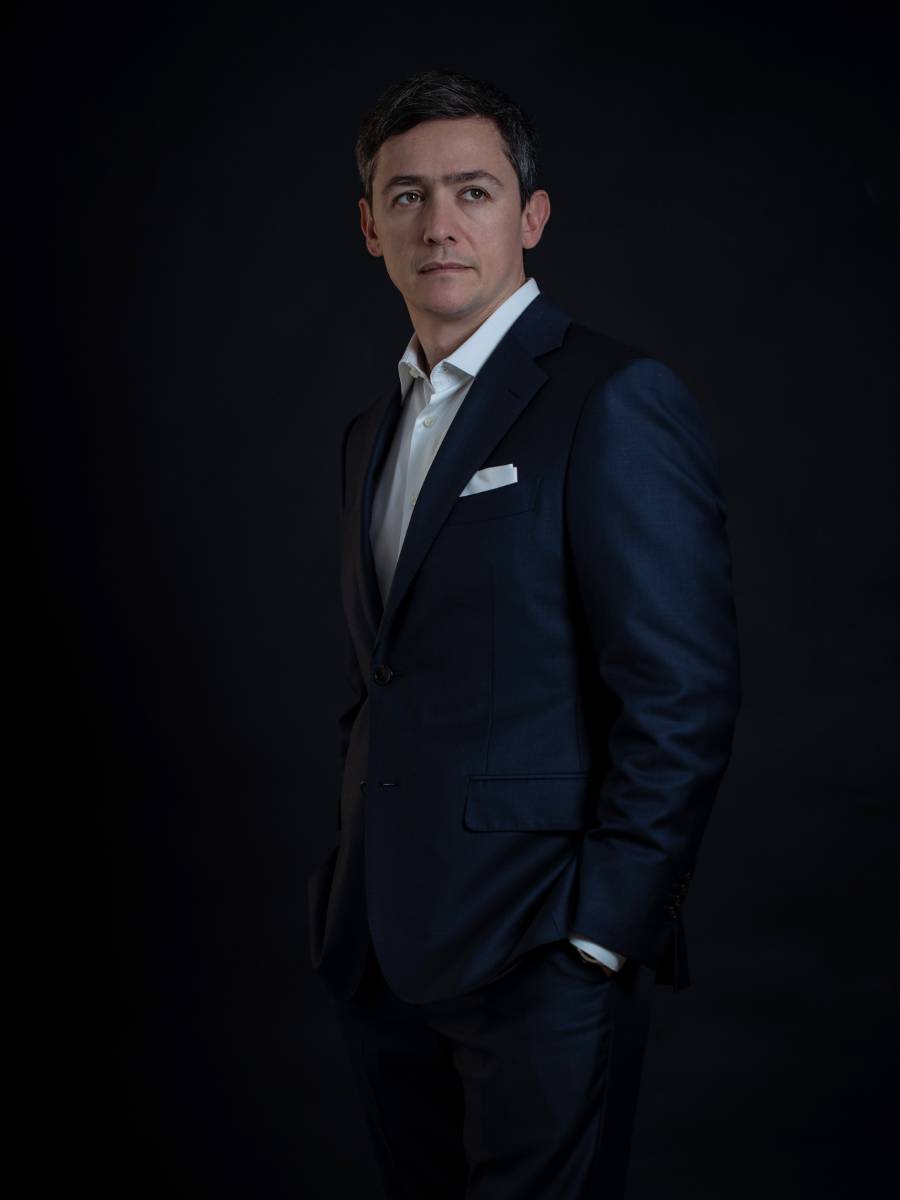
Alexander Vinogradov
Bass
Born in Moscow to a musical family, internationally celebrated bass Alexander Vinogradov made his debut at the Bolshoi Theatre at the age of 21 as Oroveso in Norma. He has worked with leading conductors including Gustavo Dudamel, Daniel Barenboim, Kent Nagano, Vladimir Jurowski, Yannick Nezet-Seguin, Lorin Maazel, Mariss Jansons, Zubin Mehta, Placido Domingo, Valery Gergiev, Philippe Jordan, Antonio Pappano, Yuri Temirkhanov, Vasily Petrenko, Dmitrij Kitajenko, and Helmuth Rilling.
This 2024/25 season will see Alexander make returns to Teatro alla Scala as Padre Guardiano La forza del destino and to The Metropolitan Opera as Ramfis Aida and Don Basilo Il Barbiere di Siviglia. On the concert platform he will sing Ivan the Terrible with Orquesta y Coro Nacionales de España/Pablo González, Shostakovich’s Symphony No. 14 with São Paulo Symphony Orchestra/Vasily Petrenko and in Summer perform at the Gstaad Menuhin Festival.
Recent opera highlights include Ramfis Aida and Don Basilio Il barbiere di Siviglia at Arena di Verona, Giovanni da Procida I Vespri Siciliani at Opernhaus Zürich, Ramfis Aida at Opera Australia, Wiener Staatsoper and Teatro Real Madrid, Phillipe II Don Carlo at Hamburgische Staatsoper, Staatsoper Berlin and Fondazione del Teatro del Maggio Musicale Florentino, Zaccaria Nabucco at Staatsoper Hamburg, Opernhaus Zürich, Deutsche Oper Berlin and Semperoper Dresden, Banco Macbeth at Teatro San Carlo and Escamillo Carmen and Fiesco Simon Boccanegra at Staatsoper Hamburg.
Recent concert appearances include Verdi’s Requiem at Opernhaus Zürich, the Royal Albert Hall, Teatro alla Scala and La Monnaie, Shostakovich’s Symphony No. 13 with SWR Symphonieorchester, Beethoven’s Ninth Symphony at Arena di Verona and Rachmaninov’s The Bells with the BBC Scottish Symphony Orchestra at the Edinburgh International Festival.
Previous opera enagements include Count Walter Luisa Miller, Raimondo Lucia di Lammermoor and Escamillo Carmen for the Metropolitan Opera, Fiesco Simon Boccanegra, Banquo, Count Walter, Zaccaria Nabucco and Phillippe II Don Carlos for Hamburgische Staatsoper, Procida I vespri siciliani, Banquo and Filippo II Don Carlo in Valencia, Filippo II in Los Angeles and Athens, Silva Ernani in Marseilles and Melbourne, Attila in Sydney, Méphistophélès Faust in Macerata and Jerez and Escamillo in Rome, Zürich, Munich and Arena di Verona, Timur Turandot and 4 villains in Tales of Hoffmann in Barcelona, Marcel Les Huguenots in Brussels, Enrico VIII Anna Bolena, Rodolfo Sonnambula and Banco in Teatro San Carlo di Napoli, Zaccaria in Florence, Dresden, Verona, Madrid, Berlin and at the Royal Opera House Covent Garden. Alexander has appeared at many festivals and opera houses around the world, including Teatro alla Scala, Royal Opera House Covent Garden, Opéra National de Paris, Deutsche Staatsoper Berlin, Staatsoper Hamburg, Staatsoper Munich, Staatsoper Vienna, Teatro Real Madrid, Teatro La Fenice, Théâtre du Châtelet, Ravinia Festival, Macerata Festival, Gergiev Festival, Palau de les Arts Valencia, Opéra de Lyon, Bolshoi Theatre, Semperoper Dresden, Santa Fe Opera, Grand Théâtre de Bordeaux, Washington National Opera, Teatro Colon, Buenos Aires, Teatro Teresa Carreño Caracas, New National Theatre Tokyo, Hollywood Bowl, Teatro Regio Turin, Opéra de Monte-Carlo, Teatro de la Maestranza, Teatro Massimo di Palermo, Teatro San Carlo and Arena di Verona.
His discography includes Beethoven’s Symphony No. 9 with Zubin Mehta, Carmen with Daniel Barenboim, Mahler’s Symphony No. 8 with Gustavo Dudamel, Shostakovich 13th & 14th Symphonies with Vassily Petrenko, Luisa Miller from Venice, Ernani from Monte Carlo, Nabucco with Placido Domingo from Florence, Rachmaninov songs with Ian Burnside, Petite Messe Solennelle with Ottavio Dantone, Tchaikovsky’s Iolanta with Kitajenko and Nabucco from Maggio Musicale.
Hector Berlioz
Hannu Lintu begins his second season as Principal Conductor of the Gulbenkian Orchestra with one of Berlioz’s most striking and grandiose creations, The Damnation of Faust. Captivated by Goethe’s tragic poem, Berlioz wrote in his memoirs how much “this marvellous work” had fascinated him from the very first page. “I couldn’t put the book down, I read it constantly, during meals, in the theatre, in the streets and everywhere.” That fascination can be heard in this performance shared with the Gulbenkian Choir and a quartet of leading soloists.
Sponsor Gulbenkian Music
The Calouste Gulbenkian Foundation reserves the right to collect and keep records of images, sounds and voice for the diffusion and preservation of the memory of its cultural and artistic activity. For further information, please contact us through the Information Request form.
